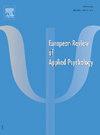一项评估年轻人情绪化饮食、社交媒体使用和身体感知之间关系的横断面研究
IF 1.4
4区 心理学
Q3 PSYCHOLOGY, APPLIED
European Review of Applied Psychology-Revue Europeenne De Psychologie Appliquee
Pub Date : 2025-06-01
DOI:10.1016/j.erap.2025.101080
引用次数: 0
摘要
目的:年轻人社交媒体使用的增加可能会影响他们的饮食行为。本研究旨在评估2019冠状病毒病大流行期间年轻人的情绪性饮食状况,并研究社交媒体使用、认知约束和不受控制的饮食与情绪性饮食行为之间的关系。方法对201名年龄在18-35岁之间的个体进行问卷调查,共29个问题,采用身高和体重测量方法计算体重指数。问卷还包括“社交媒体成瘾量表-成人表格”、“身体形象量表”、“三因素饮食量表”和“情绪饮食量表”。采用数字、百分比值、卡方、单因素方差分析、独立样本T检验和回归分析对数据进行评价。结果与男性相比,女性情绪性进食的概率增加(OR, 8871; 95% CI, 3368-23.391)。体重指数18.5 kg/m2 (OR, 0.095; 95% CI, 0.016 - 0.542)和18.5 - 24.9 kg/m2与体重指数25.0-29.9 kg/m2 (OR, 0.176; 95% CI, 0.047 - 0.654)的个体相比,情绪性进食的可能性更小。研究表明,在社交媒体上对营养分享感兴趣的人中,有90.2%的人会情绪化进食。研究发现,有情绪饮食行为个体的社交媒体成瘾量表得分、不受控制的饮食行为得分和认知约束行为得分平均值均高于无情绪饮食行为个体。结论在流感大流行期间,情绪性进食在年轻人中很常见。研究发现,情绪化进食与社交媒体使用和身体形象有关。本文章由计算机程序翻译,如有差异,请以英文原文为准。
A cross-sectional study to evaluate the relationship between emotional eating, social media use and body perception in young adults
Objective
The increase in social media use in young adults may affect their eating behaviors. In this study, it was aimed to evaluate the emotional eating status of young adults during the COVID-19 pandemic and to examine the relationship between social media use, cognitive restraint and uncontrolled eating, and emotional eating behavior.
Methods
In this study, a questionnaire containing 29 questions was applied to 201 individuals between the ages of 18–35, and their body mass index was calculated using height and body weight measurements. The questionnaire also includes “Social Media Addiction Scale-Adult Form”, “Body Image Scale”, “Three-Factor Eating Scale” and “Emotional Eating Scale”. Number, percentage values, Chi-square, One Way ANOVA independent samples T test and Regression analyzes were used to evaluate the data.
Results
It was found that the probability of emotional eating was increased in women (OR, 8871; 95% CI, 3368–23.391) compared to men. Body mass index < 18.5 kg/m2 (OR, 0.095; 95% CI, 0.016−0.542) and 18.5–24.9 kg/m2 compared to individuals with a body mass index of 25.0–29.9 kg/m2 (OR, 0.176; 95% CI, 0.047−0.654) was found to be less likely to emotional eating. It has been determined that 90.2% of individuals who are interested in nutrition shares on social media have emotional eating. It was determined that the social media addiction scale score, uncontrolled eating behavior score and cognitive restraint behavior score averages of individuals with emotional eating behavior were higher than individuals without emotional eating behavior.
Conclusion
It has been determined that emotional eating is common in young adults during the pandemic. Emotional eating was found to be associated with social media use and body image.
求助全文
通过发布文献求助,成功后即可免费获取论文全文。
去求助
来源期刊

European Review of Applied Psychology-Revue Europeenne De Psychologie Appliquee
PSYCHOLOGY, APPLIED-
CiteScore
2.20
自引率
20.00%
发文量
38
期刊介绍:
The aim of the Revue européenne de Psychologie appliquée / European Review of Applied Psychology is to promote high-quality applications of psychology to all areas of specialization, and to foster exchange among researchers and professionals. Its policy is to attract a wide range of contributions, including empirical research, overviews of target issues, case studies, descriptions of instruments for research and diagnosis, and theoretical work related to applied psychology. In all cases, authors will refer to published and verificable facts, whether established in the study being reported or in earlier publications.
 求助内容:
求助内容: 应助结果提醒方式:
应助结果提醒方式:


